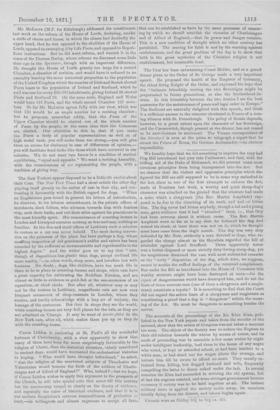Mr. McLaren (M.P. for Edinburgh) addressed his constituents last week
on the reform of the House of Lords, declaring, amidst a strife of cheers and hisses, in which the cheers had decidedly the upper hand, that he was opposed to the abolition of the House of Lords, opposed to swamping it by Life Peers, and opposed to Repub- lican institutions. But he did want reform, and wanted it in the sense of Sir Thomas Bazley, whose scheme we discussed some little time ago in the Spectator, though with an important difference. He thought the House of Lords greatly too large for a second Chamber, a chamber of revision, and would have it reduced to an assembly bearing the same numerical proportion to the population of the United Kingdom which the number of Irish and Scotch elected Peers bears to the population of Ireland and Scotland, which he said was one for every 200,000 inhabitants, giving Ireland 28 elected Peers and Scotland 16. On the same scale, England and Wales would have 113 Peers, and the whole second Chamber 157 mem- bers. So far Mr. McLaren agrees fully with our view, which was that 150 would be au ample number for a revising chamber ; but he proposes, somewhat oddly, that the Peers of the Upper Chamber should bo elected out of the whole number of Peers by the people, at the same time that the Commons are elected. Our objection to this is, that if you make the Peers a body of popular representatives as well as of high social rank, you will make them too strong,—you will give them an excuse for obstinacy in case of differences of opinion,— you will facilitate dead-locks like those which have occurred in our colonies. We do not want two forces in a condition of statical equilibrium, "equal and opposite." We want a revising Assembly, with the consciousness of sot representing the people, with a tradition of giving way.










































 Previous page
Previous page